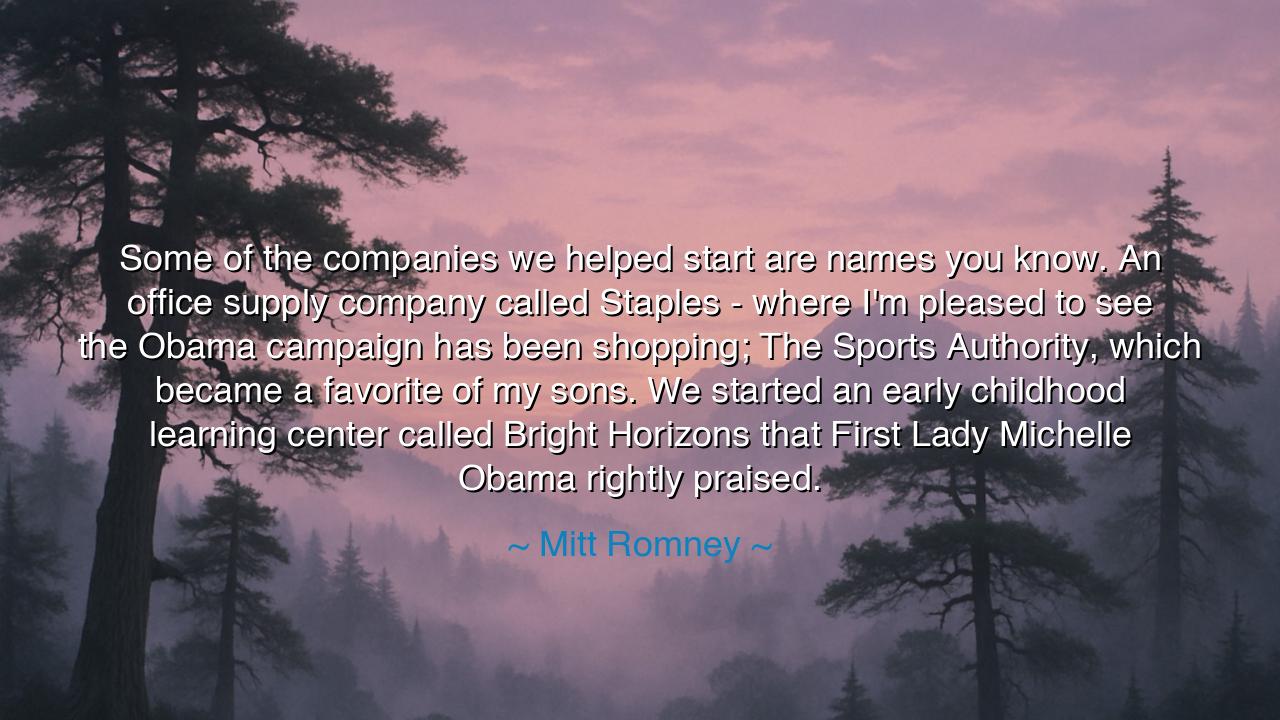
Some of the companies we helped start are names you know. An
Some of the companies we helped start are names you know. An office supply company called Staples - where I'm pleased to see the Obama campaign has been shopping; The Sports Authority, which became a favorite of my sons. We started an early childhood learning center called Bright Horizons that First Lady Michelle Obama rightly praised.






When Mitt Romney said, “Some of the companies we helped start are names you know. An office supply company called Staples - where I'm pleased to see the Obama campaign has been shopping; The Sports Authority, which became a favorite of my sons. We started an early childhood learning center called Bright Horizons that First Lady Michelle Obama rightly praised,” he was not merely listing achievements. He was offering a reflection on the enduring power of creation, the sacred art of building institutions that outlive the hands that formed them. In his words lies the echo of the ancient truth: that the truest legacy of a person is not what they possess, but what they bring into being for the service of others.
Romney’s statement arose from his years in business, when he helped launch enterprises through Bain Capital. Yet beyond the realm of economics, this quote speaks to something larger — the spirit of enterprise as a form of human stewardship. To found a company is, in a sense, to plant a seed in the soil of society: one that grows to nourish the lives of many. Staples, The Sports Authority, Bright Horizons — these are not just businesses, but manifestations of human vision turned into structure, of ideas given life and purpose. Each stands as a testament to the capacity of imagination to become infrastructure, of effort to become endurance.
It is significant that Romney connects these ventures to his political rivals, mentioning Barack and Michelle Obama not in hostility, but with respect. This gesture reveals the higher spirit of his reflection: that creation transcends division. True builders do not labor for a tribe or a party, but for the common good. The products of their labor serve friend and foe alike, just as the sun shines upon all. The act of creation, whether in commerce, art, or governance, belongs to humanity itself — a universal offering that dissolves the boundaries of ideology.
The ancients honored this principle deeply. When Solon of Athens reformed his city’s laws, he did not do so to glorify himself, but to build something that would outlast him — a civic order that nurtured generations of thinkers, traders, and poets. When the architects of Rome laid the first stones of their roads and aqueducts, they knew that those structures would serve future emperors they would never meet. Likewise, when an entrepreneur like Romney builds a company that employs thousands, or educates children through Bright Horizons, he partakes in that same eternal act: to labor not only for the present, but for the future.
Yet his words also carry a quiet humility. When he says, “we helped start,” he acknowledges that creation is a collective act — that behind every founder stands a host of dreamers, laborers, and believers. No man builds alone. Every vision requires the strength of others to sustain it. It is the same wisdom found in the cathedrals of the Middle Ages, whose architects began projects they knew they would never live to see completed. To build something enduring is to enter into a covenant with time — to give one’s energy now, so that others may benefit later.
The lesson within Romney’s reflection is both practical and moral: measure your life not by what you consume, but by what you create. Whether it is a business, a family, a piece of art, or a movement of compassion, the things you bring into the world with integrity will one day stand as your true monuments. Wealth fades, fame dissolves, but the structures built with purpose — those that uplift others — will continue to bear fruit. In every generation, it is the builders, not the destroyers, who light the way forward.
So, to those who hear these words, take heed: strive to be a creator of value, not merely a seeker of gain. Let your work — whatever form it takes — contribute to the well-being of others. Celebrate not only success, but usefulness. Be like the tree that gives shade to those who never planted it. For in the end, it is not political victories or personal acclaim that define greatness, but the quiet, enduring things we leave behind — the schools that teach, the companies that employ, the institutions that nurture.
Thus, in Mitt Romney’s reflection, there is a modern echo of ancient wisdom: that the measure of a person is found in what they build for humanity. The office, the marketplace, the classroom — these are the temples of our age. And those who build them with integrity, who create not for conquest but for contribution, are the true architects of civilization.






AAdministratorAdministrator
Welcome, honored guests. Please leave a comment, we will respond soon